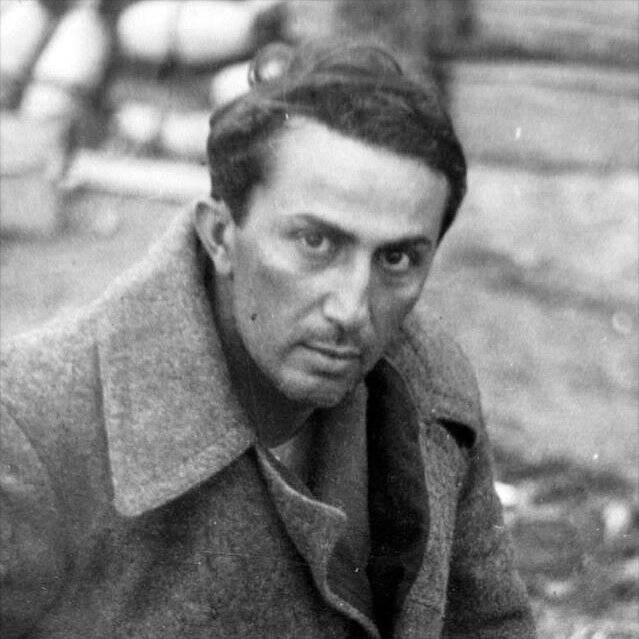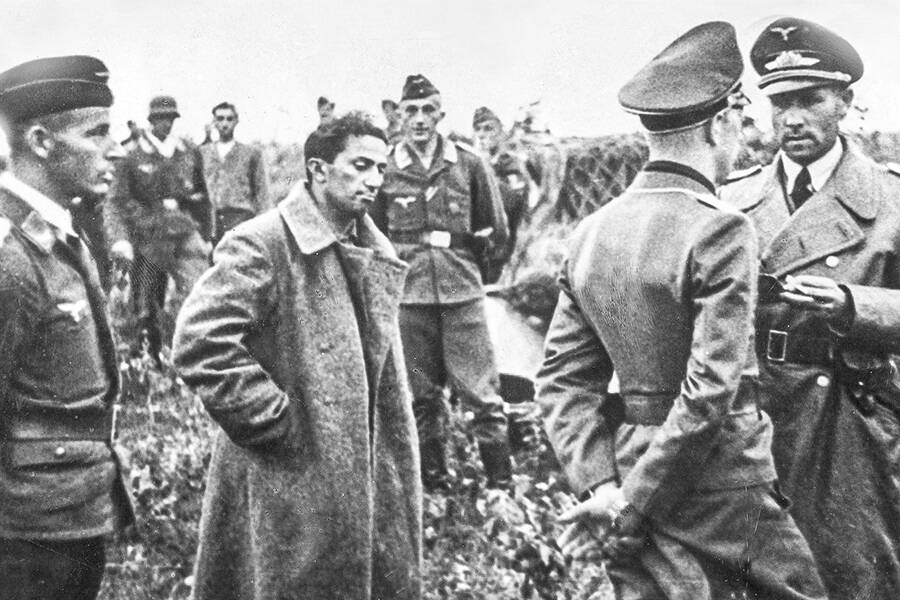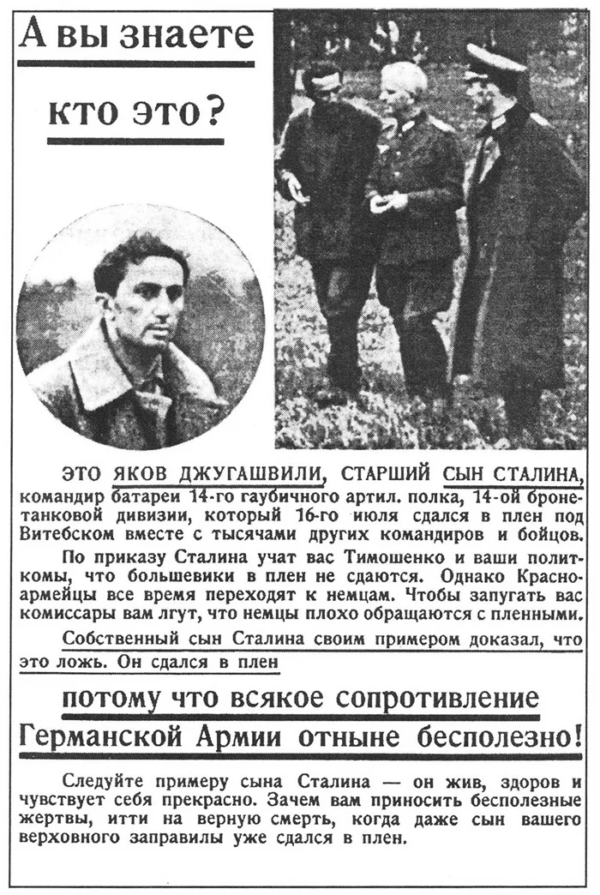The oldest son of Soviet dictator Joseph Stalin, Yakov Dzhugashvili's life was marked with tragedy, ultimately culminating in his gruesome death in a German concentration camp.

Wikimedia CommonsHitler attempted to exchange Stalin’s first son Yakov Dzhugashvili for a captured German field marshal, but the Soviet dictator declined.
In 1907, Joseph Stalin wasn’t known as the leader of the Soviet Union. In fact, he wasn’t known as Joseph Stalin at all. He was a Marxist robber from a poor family, a would-be priest had he not rebelled and become an atheist. His name was Iosif Vissarionovich Dzhugashvili.
That year, Dzhugashvili robbed a bank in Tiflis, stealing about $3.4 million for the Bolshevik cause and securing his place among Vladimir Lenin’s most coveted followers. That same year, Dzhugashvili’s wife, Yekaterina Svanidze, gave birth to his first son, Yakov Dzhugashvili.
However, there was no time for the family to celebrate. Tzarist police were hunting Dzhugashvili, and the family was forced to flee to Baku in Azerbaijan. Along the way, Iosif’s wife fell ill with typhus, and only nine months after their son’s birth, she passed away at just 22.
Overcome with grief, Iosif Dzhugashvili adopted a new name: Joseph Stalin, “Man of Steel.” He plunged himself further into his revolutionary duties, leaving his son Yakov to be raised by his dead wife’s family in Tbilisi.
Meanwhile, as his father was fighting alongside Lenin in the Russian Revolution, Yakov Dzhugashvili remained with his aunt, growing into a sensitive and withdrawn young man. Then in 1921, his father sent for him — launching him on a tumultuous path.
Yakov Dzhugashvili And Joseph Stalin’s Tense Relationship
If Joseph Stalin was anything, it was ruthless. Certainly, his lack of compassion aided him and his fellow Bolshevik revolutionaries, but when it came to matters of the heart, Stalin was as distant as a dying star.
While Stalin’s mother had been a more caring parent pushing for her son to lead a good life and become a priest, his own father was an alcoholic and a violent drunk. Stalin, much like his father before him, physically and emotionally abused his own son, Dzhugashvili. He forbade him from changing his last name to Stalin. For all the name entailed, the message was clear: Yakov Dzhugashvili would never be a “Stalin.”
Some historians believe Stalin’s disdain for Dzhugashvili stemmed from the boy’s similarities to his mother — the ever-grieving Stalin couldn’t bear the resemblance. At her funeral, Yekaterina’s relatives recalled that Stalin had seemingly lost his mind and jumped into the grave carrying his wife’s body.

Getty ImagesJoseph Stalin was cold and ruthless, both as a leader and as a father.
When Dzhugashvili eventually came to live with Stalin, he found out that his father had remarried and had two kids with his second wife, Nadezhda Alliluyeva. Dzhugashvili’s brother, Vasily Stalin, was born in 1921, and his sister, Svetlana, was born in 1926.
Each child experienced their own personal tragedy — Vasily was a heavy drinker later in life, and Svetlana, though Stalin’s clear favorite, had to deal with her mother’s suicide at age six — but Dzhugashvili’s relationship was perhaps the most tumultuous.
A Suicide Attempt And Joining The Military
Stalin and Dzhugashvili’s relationship grew tenser when, in the late 1920s, Dzhugashvili met a young woman named Zoya Gunina, the daughter of an Orthodox priest.
Dzhugashvili and Zoya began living together and eventually decided to marry. The two arrived at the Stalin dacha — a small cottage typically used as a vacation home — to announce their decision to Stalin. Rather than celebrating, though, Stalin flew into a violent rage.
His anger was so intense that it caused Zoya to flee the home in terror. Yakov Dzhugashvili, once again failing to appease his father, fell into a state of nervous delirium.
Brandishing a pistol, Yakov Dzhugashvili fired a bullet into his chest, attempting to shoot himself in the heart. Instead, he missed, and the bullet traveled into his lung. Nadezhda bandaged the young man’s chest and called for a doctor.
According to one version of the story reported by Defense Media Network, Stalin shook his head and dismissively said to his son, “You can’t even do this properly.”
Yakov Dzhugashvili and Zoya did eventually marry, but their life together was anything but happy. The daughter they had together died early in infancy, and the marriage lasted less than two years.
Not long after in 1941, Dzhugashvili enrolled in the Red Army Artillery Academy at his father’s insistence. He had been a turbine engineer prior to joining the academy, but by the time he left, Senior Lieutenant Yakov Dzhugashvili had been appointed commander of an artillery battery — only one month prior to the German invasion of the USSR.
Captured By German Soldiers And Abandoned
Dzhugashvili was a reserve fighter in the Red Army, but when war broke out he was sent to battle as if he were just another typical commander. Rather than seeing him off personally, Stalin called his son on the telephone and shouted at him, “Go and fight!”
Dzhugashvili’s time on the battlefield was short-lived, however. In early July 1941, Dzhugashvili and members of his 20th Army surrendered to German troops in Belorussia. Dzhugashvili attempted to escape on the 16th but to no avail.

Global Look PressAs a prisoner, Dzhugashvili was treated well as the Germans wanted to win him over in a propoganda ploy.
Several of Yakov Dzhugashvili’s servicemen betrayed his identity to the Germans, but the Nazis had no intention of executing or torturing him.
Instead, they treated him civilly, and when they interrogated him, they questioned him more about his personal and political views than they did about military matters. Their ultimate plan was to entice Dzhugashvili into joining their side, using the powerful Nazi propaganda machine to demonstrate how Stalin’s own son betrayed him.
That same propaganda machine ensured that news of Yakov Dzhugashvili’s capture was widely publicized, and though Dzhugashvili had been taken captive against his will, the Nazis publicly claimed he willingly surrendered.
At first, Stalin believed this version of events. But as more information trickled in, he became aware that his son had indeed been taken against his will and had not betrayed his country.
A Gruesome Death At A Concentration Camp
Stalin tried several discreet rescue attempts to recover Dzhugashvili from the Germans, but each was unsuccessful.
Around the same time, Hitler offered Stalin a deal: the Germans would exchange his son for Field Marshal Friedrich Paulus, who the Russians took prisoner at Stalingrad. In response, Stalin said, “I do not trade field marshals for lieutenants.”
As Russia Beyond reported, Red Army Marshal Georgy Zhukov wrote in his personal journal that he had asked Stalin about Dzhugashvili and Stalin said to him, “Yakov won’t get out of captivity. The Fascists will shoot him … No, Yakov would prefer death to betraying the Motherland.”
Stalin’s words proved to be true, and his son persisted in defying the Germans’ attempts at cooperation. Their previously kind treatment grew harsh, and eventually, they lost all interest in Yakov Dzhugashvili.
Then, on April 14, 1943, Dzhugashvili attempted to escape the Nazi concentration camp at Sachsenhausen, historical notes from TIME stated. Dzhugashvili carefully navigated a maze of trip wires and reached the fence at the edge of the camp.

Public DomainGerman propaganda from 1941 that reads, “This is Yakov Dzhugashvili, Stalin’s son and artillery officer … who on 16 July has surrendered near Vitebsk, together with thousands of other soldiers and officers … Follow his example – he is alive and well, and feels great … Why do you fight to the death when even the son of your leader has surrendered?”
At this point, Stalin’s son is said to have defiantly shouted at a nearby S.S. guard, “Don’t be a coward! Shoot, shoot!” And then he made a grab for the fence, with the guard firing a single bullet.
While the official story put out by Nazis at the time claimed that Yakov Dzhugashvili was gunned down during an escape attempt — they released photos of his bullet-riddled corpse — recent insight has revealed that Dzhugashvili’s “escape” attempt was actually more likely an act of suicide.
Feeling abandoned by his father, Yakov Dzhugashvili threw himself into an electrified fence seeking to end his life.
Professor John Erickson, an authority on the Soviet-German battlefront, told Defense Media Network that a 12-year investigation revealed that “the guard certainly shot Yakov four times, but it is now known that he fired the bullets into Yakov’s already dead body.”
The Legacy Of Yakov Dzhugashvili
After the war, unaware of what had happened to his son, Stalin offered a $250,000 reward in East Germany to anyone who could provide details of his death. According to his daughter, Svetlana, in her book Twenty Letters to a Friend, Stalin only knew that Yakov had been shot, but not where or why.
In 1945, U.S. and British intelligence found a German dossier on Dzhugashvili which included an autopsy report, depositions from guards and prisoners, pictures of Yakov’s body stretched out along the fence, and a letter from Nazi Commander Heinrich Himmler confirming Dzhugashvili’s death.
Aware of this information, President Franklin Roosevelt and British Prime Minister Winston Churchill decided to withhold it from Stalin in order to spare him any personal suffering.
Yakov Dzhugashvili was posthumously awarded the Order of the Patriotic War first class in 1977.
If you or someone you know is contemplating suicide, call the National Suicide Prevention Lifeline at 1-800-273-8255 or use their 24/7 Lifeline Crisis Chat.
After this look at the tragic life of Yakov Dzhugashvili, learn about the death of Joseph Stalin. Then, learn about Vasily Blokhin, the executioner who killed 7,000 Poles during the Katyn Massacre.





